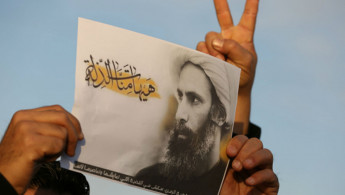Saudi executions reaction reflects regional rivalries
The death sentences, carried out on Saturday, ignited reactions from commendation to condemnation, largely reflecting regional and international alliances and rivalries.
The United Arab Emirates, a strong Saudi ally, said the implementation of the sentences reflected Riyadh's determination to fight terrorism.
"[The executions are] a clear message against terrorism and those who call for and incite sedition and unrest to tear apart society's unity and threaten social peace in the kingdom," said Emirati foreign minister Sheikh Abdullah bin Zayed al-Nahyan.
Welcoming the Saudi move, a scholar from Egypt's prominent Sunni authority al-Azhar said the executions were in line with Islamic teachings against terrorists found guilty of murder and sabotage.
"Saudi Arabia has applied God's law," said Fawzi al-Zafzaf.
 |
Saudi Arabia has applied God's law - al-Azhar scholar |
 |
Bahrain, which hosts Saudi troops helping to keep a tight grip on protesters following an uprising in 2011, reaffirmed its support of its Saudi ally in efforts to "combat terrorism".
The Bahraini Ministry of Interior asserted its support of "Saudi Arabia's actions in the fight against terrorism as part of the strong and historical ties between the two countries".
In a statement, Bahrain warned that "legal action will be taken against anyone attempting to misuse the recent verdicts in Saudi Arabia".
Reaction from western nations and international organisations ranged from muted responses to forthright condemnations.
The US expressed concerns over the execution of Nimr, saying it risked "exacerbating sectarian tensions at a time when they urgently need to be reduced".
Britain's foreign office released a statement asserting the UK position against the death penalty, that relations with Saudi Arabia need to mature so that the countries can "be candid with each other" about human rights issues and called for restraint on all sides.
British foreign office minister Tobias Ellwood had initially called the executions "disappointing".
Other prominent British politicians and figures further commented.
Shadow Foreign Secretary Hilary Benn said the execution of Nimr al-Nimr was "profoundly wrong".
But focusing particularly on the al-Qaeda supporters who were among the 47 executed prisoners, Sir John Jenkins, a former British ambassador to Saudi Arabia, said the executions were "understandable".
Germany, however, condemned the executions, calling the death penalty an "inhumane form of punishment".
The German government's human rights envoy, Christoph Straesser, took to social media to express his outrage.
Twitter Post
|
Meanwhile, UN Secretary-General Ban Ki-moon expressed serious concern over the executions, urging Saudi Arabia to commute all future death sentences.
"Sheikh al-Nimr and a number of the other prisoners executed had been convicted following trials that raised serious concerns over the nature of the charges and the fairness of the process," said Ban's spokesperson.
Sheikh Nimr al-Nimr was a leading Saudi Shia cleric and figurehead in anti-government protests that erupted in the wake of the Arab Spring.
 |
Sheikh al-Nimr and a number of the other prisoners executed had been convicted following trials that raised serious concerns over the nature of the charges and the fairness of the process - Ban Ki-moon |
 |
Reactions to the executions in Shia-majority countries focused on his death.
Iran's Supreme Leader Ali Khamenei expressed outrage at the execution, warning Riyadh it would face "divine revenge".
Iran's government and religious leaders also condemned the move, and said the Saudi regime would pay dearly.
Relations between Saudi Arabia and Iran have since been cut in a diplomatic row.
Iraqi Prime Minister Haider al-Abadi also condemned the executions, saying they would destabilise the reigon.
Abadi asserted that executions of opponents led to "nothing but more destruction" and that the violation of human rights "leads to repercussions on the security, stability and the social fabric of the peoples of the region".
Nimr's execution sparked outrage in Shia communities across the Middle East, notably from the people of Iran, Lebanon and Bahrain who took to the streets in protest.
Human rights groups also expressed deep concern over the executions.
Human Rights Watch described the deaths as "the most serious crime imaginable", calling on the international community to intervene to stop any further bloodshed.
Amnesty International said that Nimr had been "executed to settle political scores".
Amnesty's Middle East and North Africa director, Philip Luther, told AFP that Nimr's trial was both politicised and "grossly unfair, because the international standards for fair trial were grossly flouted".


![President Pezeshkian has denounced Israel's attacks on Lebanon [Getty]](/sites/default/files/styles/image_684x385/public/2173482924.jpeg?h=a5f2f23a&itok=q3evVtko)



 Follow the Middle East's top stories in English at The New Arab on Google News
Follow the Middle East's top stories in English at The New Arab on Google News


